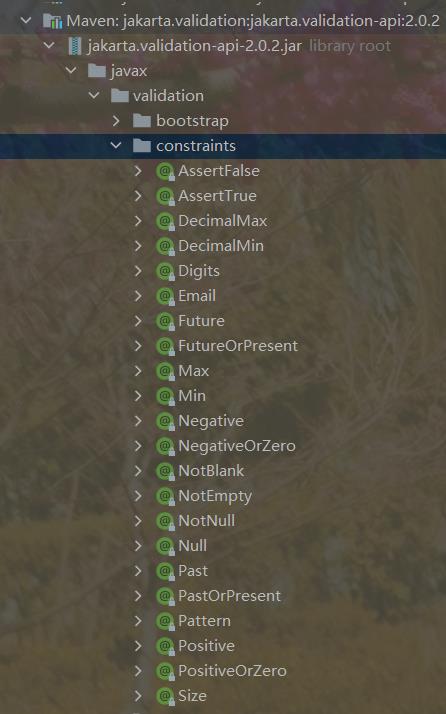SpringBoot
Posted 思想累积
tags:
篇首语:本文由小常识网(cha138.com)小编为大家整理,主要介绍了SpringBoot相关的知识,希望对你有一定的参考价值。
1、SpringBoot 是什么
SpringBoot 是一个服务于框架的的框架,简化了 spring 众多框架中大量且繁琐的配置文件,可以快速开启一个 web 容器进行开发。
2、SpringBoot 原理
2.1 pom.xml
-
spring-boot-dependencies:核心依赖在父工程中,在引入一些 SpringBoot 依赖的时候不需要指定版本
<parent> <groupId>org.springframework.boot</groupId> <artifactId>spring-boot-dependencies</artifactId> <version>2.5.0-SNAPSHOT</version> </parent>
2.2 启动器
-
springboot 会将所有的功能场景变为一个个启动器,在需要使用的时候找到对应的启动器即可
<dependency> <groupId>org.springframework.boot</groupId> <artifactId>spring-boot-starter</artifactId> </dependency>
2.3 自动装配原理
import org.springframework.boot.SpringApplication;
import org.springframework.boot.autoconfigure.SpringBootApplication;
// 程序主入口,标注这个类是一个 springboot 应用
@SpringBootApplication
public class DemoApplication {
public static void main(String[] args) {
// 将 springboot 应用启动
SpringApplication.run(DemoApplication.class, args);
}
}
@SpringBootApplication 注解:
@SpringBootConfiguration:springboot 配置
@Configuration:spring 配置
@Component:spring 的组件
@EnableAutoConfiguration:自动配置
@AutoConfigurationPackage:自动配置包
@Import(AutoConfigurationPackages.Registrar.class):自动注册包
@Import(AutoConfigurationImportSelector.class)
// 获取所有的配置
List<String> configurations = getCandidateConfigurations(annotationMetadata, attributes);
获取候选的配置
protected List<String> getCandidateConfigurations(AnnotationMetadata metadata, AnnotationAttributes attributes) {
List<String> configurations = SpringFactoriesLoader.loadFactoryNames(this.getSpringFactoriesLoaderFactoryClass(), this.getBeanClassLoader());
Assert.notEmpty(configurations, "No auto configuration classes found in META-INF/spring.factories. If you are using a custom packaging, make sure that file is correct.");
return configurations;
}
- SpringBoot 在启动的时候从类路径下的 META-INF/spring.factories 中获取 EnableAutoConfiguration 指定的值
- 将这些值作为自动配置类导入容器,自动配置类就生效,帮我们进行自动配置工作
- springboot 启动会加载大量的自动配置类(XXXXAutoConfiguration),给容器中添加组件
- 只要我们需要的组件在其中,我们就不需要再手动配置了,给容器中自动配置类添加组件的时候,会从 properties 中获取某些属性,我们只需要在配置文件中指定这些属性的值即可。
可以在配置文件中 debug: true 查看哪些自动配置类生效,哪些未生效
主启动类
SpringApplication 类主要作用
- 推断应用的类型是普通项目还是 web 项目
- 查找并加载所有可用初始化器,设置到 initialize 属性中
- 找出所有的应用程序监听器,设置到 listeners 属性中
- 推断并设置 main 方法的定义类,找到运行的主类
3、SpringBoot 配置
application.properties 配置文件
# properties 文件只能以键值对形式
server.port=8081
name=sqdkk
age=21
YAML 标记语言,application.yml 配置文件,yml 可以直接给实体类赋值
# key - value
name: sqdkk
# 对象
student:
name: sqdkk
age: 21
# 行内写法
student2: {name: sqdkk,age: 21}
# 数组
persons1:
- 小明
- 小红
- 小白
persons2: [小明,小红,小白]
@ConfigurationProperties(prefix = “XXX”) 作用:
将配置文件中配置的每个属性的值,映射到这个组件中
告诉 springboot 将本类中的所有属性和配置文件中相关的配置进行绑定
参数 prefix = “XXX” 和配置文件中 XXX 下的所有属性一一对应
@ConfigurationProperties(prefix = "XXX")
@PropertySource(value = “classpath:XXX.properties”) 加载指定的配置文件:
@PropertySource(value = "classpath:application.properties")
public class Person {
@Value("${name}")
private String name;
@Value("${age}")
private String age;
}
多环境配置及配置文件位置
springboot 默认会使用 application.properties 主配置文件
# 使用 properties 配置文件,springboot 多环境配置,可选择激活哪个配置文件
# 文件名 application-dev.properties
spring.profiles.actice=dev
# 使用 yaml 配置文件
server:
port: 8081
# 选择要激活哪个环境
spring:
profiles:
active: prod
---
server:
port: 8082
spring:
profiles: dev
---
server:
port: 8083
spring:
profiles: test
外部指定文件启动配置文件
java -jar spring-boot-config.jar --spring.config.location=F:/application.properties
多配置文件优先级别(高 → 低):
properties > yml > yaml
file:./config/ 项目路径下 config 文件夹配置文件
file:./ 项目路径下配置文件
classpath:/config/ 资源路径下的 config 文件夹配置文件
classpath:/ 资源路径下的配置文件
SpringBoot 中的延迟加载(懒加载)
yml 文件配置
spring:
main:
lazy-initialization: true # true 为开启
项目启动日志管理
spring:
main:
log-startup-info: false; # false:关闭启动日志
banner 图
- 在 resource 文件夹下创建一个 banner.txt 文件,里面的内容会作为项目启动时的信息
设置 banner 图的显示模式,默认在控制台
# log:输出在日志
# console:输出在控制台
# off:不显示 banner 图
spring:
main:
banner-mode: log
4、JSR 303 校验
导入 validation 依赖
<dependency>
<groupId>org.springframework.boot</groupId>
<artifactId>spring-boot-starter-validation</artifactId>
</dependency>

import lombok.Data;
import org.springframework.boot.context.properties.ConfigurationProperties;
import org.springframework.stereotype.Repository;
import org.springframework.validation.annotation.Validated;
import javax.validation.constraints.Email;
@Repository
@Data
@ConfigurationProperties(prefix = "person")
@Validated
public class Person {
@NotBlank(message = "名字不能为空")
private String name;
@Max(value = 120, message = "年龄最大值为 120")
private String age;
private Dog dog;
}
5、SpringBoot web 开发
5.1 静态资源
protected void addResourceHandlers(ResourceHandlerRegistry registry) {
super.addResourceHandlers(registry);
if (!this.resourceProperties.isAddMappings()) {
logger.debug("Default resource handling disabled");
} else {
ServletContext servletContext = this.getServletContext();
this.addResourceHandler(registry, "/webjars/**", "classpath:/META-INF/resources/webjars/");
this.addResourceHandler(registry, this.mvcProperties.getStaticPathPattern(), (registration) -> {
registration.addResourceLocations(this.resourceProperties.getStaticLocations());
if (servletContext != null) {
registration.addResourceLocations(new Resource[]{new ServletContextResource(servletContext, "/")});
}
});
}
}
private void addResourceHandler(ResourceHandlerRegistry registry, String pattern, String... locations) {
this.addResourceHandler(registry, pattern, (registration) -> {
registration.addResourceLocations(locations);
});
}
private void addResourceHandler(ResourceHandlerRegistry registry, String pattern, Consumer<ResourceHandlerRegistration> customizer) {
if (!registry.hasMappingForPattern(pattern)) {
ResourceHandlerRegistration registration = registry.addResourceHandler(new String[]{pattern});
customizer.accept(registration);
registration.setCachePeriod(this.getSeconds(this.resourceProperties.getCache().getPeriod()));
registration.setCacheControl(this.resourceProperties.getCache().getCachecontrol().toHttpCacheControl());
registration.setUseLastModified(this.resourceProperties.getCache().isUseLastModified());
this.customizeResourceHandlerRegistration(registration);
}
}
在 springboot 中,可以使用以下方式处理静态资源
- webjars
localhost:8080/webjars - resources,static(默认),public,/**
localhost:8080/
5.2 首页
private Resource getWelcomePage() {
String[] var1 = this.resourceProperties.getStaticLocations();
int var2 = var1.length;
for(int var3 = 0; var3 < var2; ++var3) {
String location = var1[var3];
Resource indexhtml = this.getIndexHtml(location);
if (indexHtml != null) {
return indexHtml;
}
}
ServletContext servletContext = this.getServletContext();
if (servletContext != null) {
return this.getIndexHtml((Resource)(new ServletContextResource(servletContext, "/")));
} else {
return null;
}
}
private Resource getIndexHtml(String location) {
return this.getIndexHtml(this.resourceLoader.getResource(location));
}
private Resource getIndexHtml(Resource location) {
try {
Resource resource = location.createRelative("index.html");
if (resource.exists() && resource.getURL() != null) {
return resource;
}
} catch (Exception var3) {
}
return null;
}
以上是关于SpringBoot的主要内容,如果未能解决你的问题,请参考以下文章